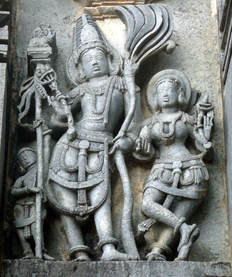 Should relationships start with love and then desire allowed its space, or do they start with desire and mature into love, and can both stay through the relationship? Ideally, in a relationship, one hopes that there are both. There is a healthy amount of desire, physical attraction and sexual chemistry, and there are strong bonds of love and emotional intimacy. Often times though, they seem to go their separate ways even if at the start of a relationship there are tons of both love and desire, or it starts with a huge amount of desire and love catches up, takes a big lead and soon desire falls behind – way behind at times. Why is that? Are we biologically coded to fall into love and lose desire along the way? Is the function of desire and sexual attraction really to get people to fall in love and once that job is done, desire withers away or gets directed elsewhere? Are different people coded differently – some built more for desire, and others more with a tendency to build intimacy and safety? Can people continue to have desire for the person they love? Often times, how we experience desire is so different from how we experience the need for love, comfort, affection and intimacy. Our mind thinks of these quite differently. It is almost as if wholly different sections of our brain are working when it comes to these emotions – just like there is a section for music and a whole different section for movement in our brains, or for any other function for that matter. If you are sceptical about it, try this exercise, loosely adapted from Esther Perel’s work: Take a sheet of paper and write down answers for the following questions: What makes me feel loved and cherished? What do I feel like doing when I love someone? What kind of activities do I feel like doing with someone I love? What kind of person do I generally find myself loving? What ten words do I most associate with the word ‘love’? Once you have written your answers, go away for a while. Watch a movie or have some dinner, or take a walk, and later when you feel different, turn the page around, and write down answers for the following questions: What makes me feel desired? What do I feel like doing when I desire someone? What kind of activities do I feel like doing with someone I desire? What kind of person do I generally find myself attracted to? What ten words do I most associate with the word ‘sexy’? When you look at your answers to both sets of questions, chances are that you have very different responses to both – a kind of Dr Jekyll and Mr Hyde situation at the extreme, but even if not as drastic, there are bound to be strong differences. Don’t worry though - you are not a two-faced character just because of how different these responses might be. In fact, it is quite normal. The challenge then is to recognize and make space for both in your life – knowing that both are valid, both need expression and both need acceptance As written for and published in The New Indian Express |
InnerSight BloggersAjanta, Mahesh and other InnerSight counsellors and guest contributors are happy to share their thoughts here. Categories
All
Archives
September 2020
|

 RSS Feed
RSS Feed